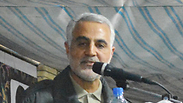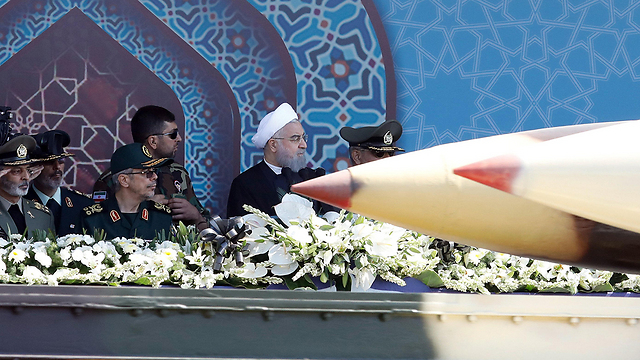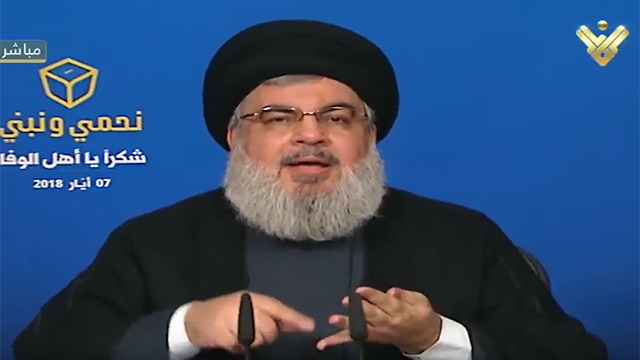
Iranian retaliatory strike put on hold, for now
Analysis: Defense establishment officials believe the Quds Force will use the coming weeks to analyze and draw conclusions from the failed attack on Israel and the IDF’s harsh response. Israel's real test, however, will take place if and when Hezbollah decides to join the conflict.
According to Israeli estimates, Quds Force commander Qassem Suleimani will use the coming weeks to analyze the events of the past few days and draw conclusions. It’s quite possible that he will eventually choose a different way to achieve the desired revenge against Israel. He may prefer to carry out other activities on the border, fire missiles of a longer range from Syria or even try to carry out an attack against Jewish institutions abroad.
At the same time, defense establishment officials believe, the Quds Force will continue its efforts to find out how Israel uncovered their plans to entrench themselves in Syria.

Eleven Iranians were reportedly killed in the IDF’s latest strike. In light of the high sensitivity to Iranian deaths and the pressure from Tehran, the Quds Force will have trouble explaining another failed attack on Israel.
Iran is therefore expected to enter a waiting period and hold an internal debate on whether it should keep investing resourced in its entrenchment in Syria and risk a conflict with Israel, on the background of US President Donald Trump’s withdrawal from the nuclear agreement and the difficult economic situation in Iran.
The Israeli estimate still stands despite Iranian Parliament Member Ahmad Khatami’s threat over the weeks to “expand the range of missiles against Israel, flatten Haifa and destroy Tel Aviv if Israel tries to carry out a foolish operation against Iran.”
Israeli sources confirmed over the weekend that the IDF was responsible for the attack on the T-4 airbase in Syria, as well as for the strikes in the cities of Aleppo and Homs. We also learned that one of the weapons depots that was destroyed contained a new delivery of an air defense system from Iran, which Suleimani had planned to use to disrupt Israel’s freedom of action. Another delivery, which was destroyed three weeks ago, included long-range missiles from Iran which were the Quds Force was planning to use in its retaliatory attack.
Meanwhile, the IDF and defense establishhment are maintaining a high state of alert and being careful not to fall into complacency or smugness. In the past month, we have seen a strong and prepared IDF, which was able to restrain the political echelon and curb proposals raised by cabinet ministers to expand the activity against Iran in Syria. The army’s real test, however, will take place if and when Hezbollah decides to join the conflict.
Hezbollah has accumulated more than 100,000 rockets over the years—a lot more than the several hundred rockets the Iranians are believed to have in Syria—and has a high operational ability to use them. Hezbollah is capable of firing 1,200 rockets a day and can target almost every spot in Israel at a very accurate level, unlike the 20 rockets fired by the Quds Force—16 of which landed on Syrian territory.

Granted, the IDF’s operational program is completely different from the program it had in the Second Lebanon War in 2006, with thousands of targets and an ability to inflict a lot of damage on Hezbollah, but if the Lebanese organization joins the conflict the Israeli home front will sustain heavy damage.
So far, the Iranians have left Hezbollah out of the circle of conflict and have avoided pressuring the organization to join, understanding that it won’t be able to comply with the demand in the current political reality in Lebanon. Israeli officials believe Hezbollah has developed independence vis-à-vis Iran and has its own considerations now. “It’s no longer a puppet,” an Israeli source says.
This is where we should stop and ask the ministers, who have been walking around all smug following the successful strike in Syria, what have they done to ready the home front for the next conflict and why haven’t they pushed for the transfer of funds to local authorities to build bomb shelters and safe rooms in northern Israel.
We aren’t talking about a lot of money here: NIS 2 billion (about $560 million) are enough solve the fortification problem up to 40 kilometers from the border. In the meantime, the Defense and Finance ministries have allotted just NIS 150 million. Why? Because there has been no public pressure. The residents of the north should take advantage of this tense period to launch a justified campaign demanding protection, just like the protection that has been provided to the residents of the south.










